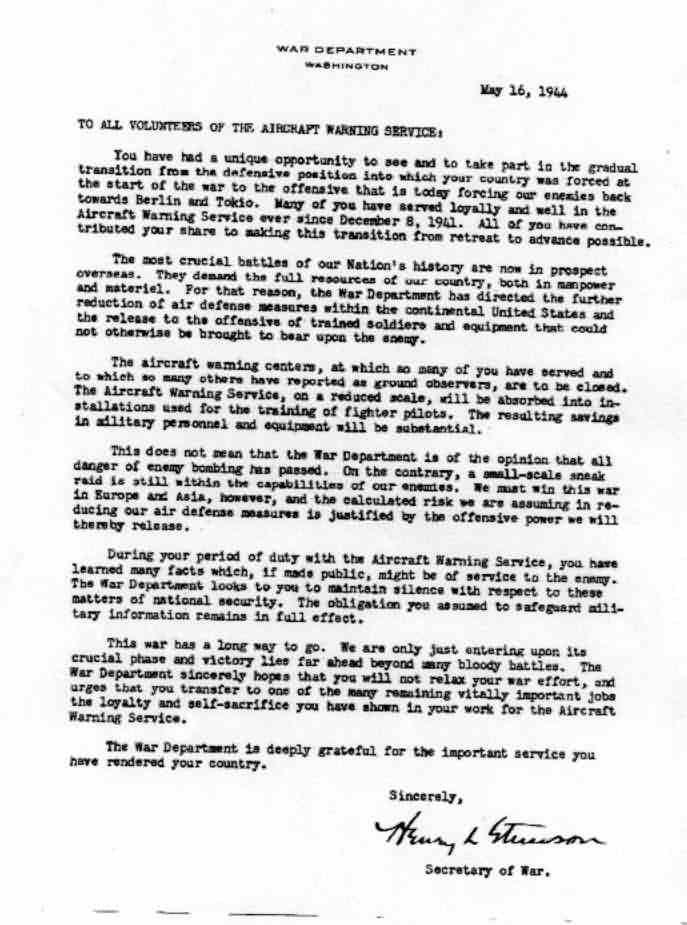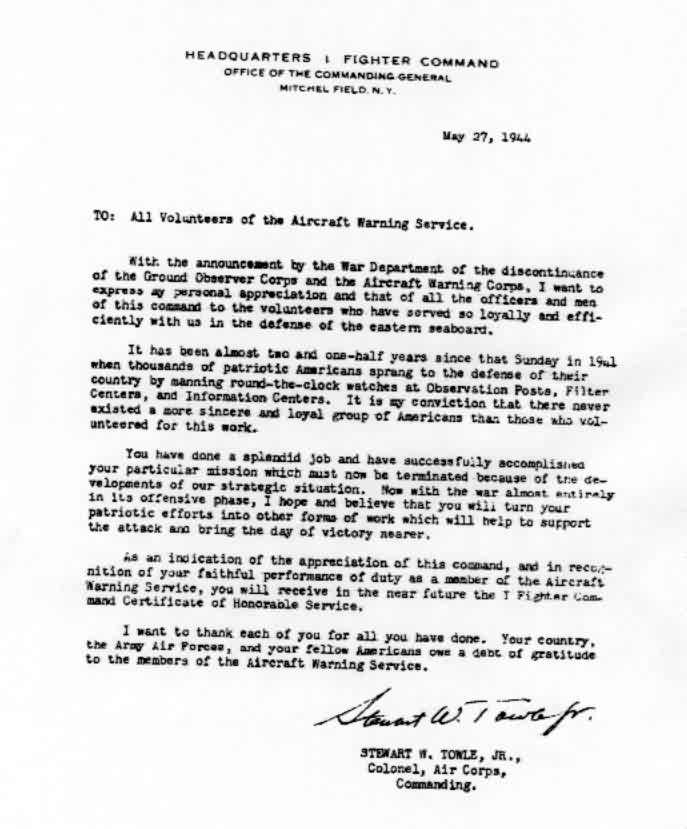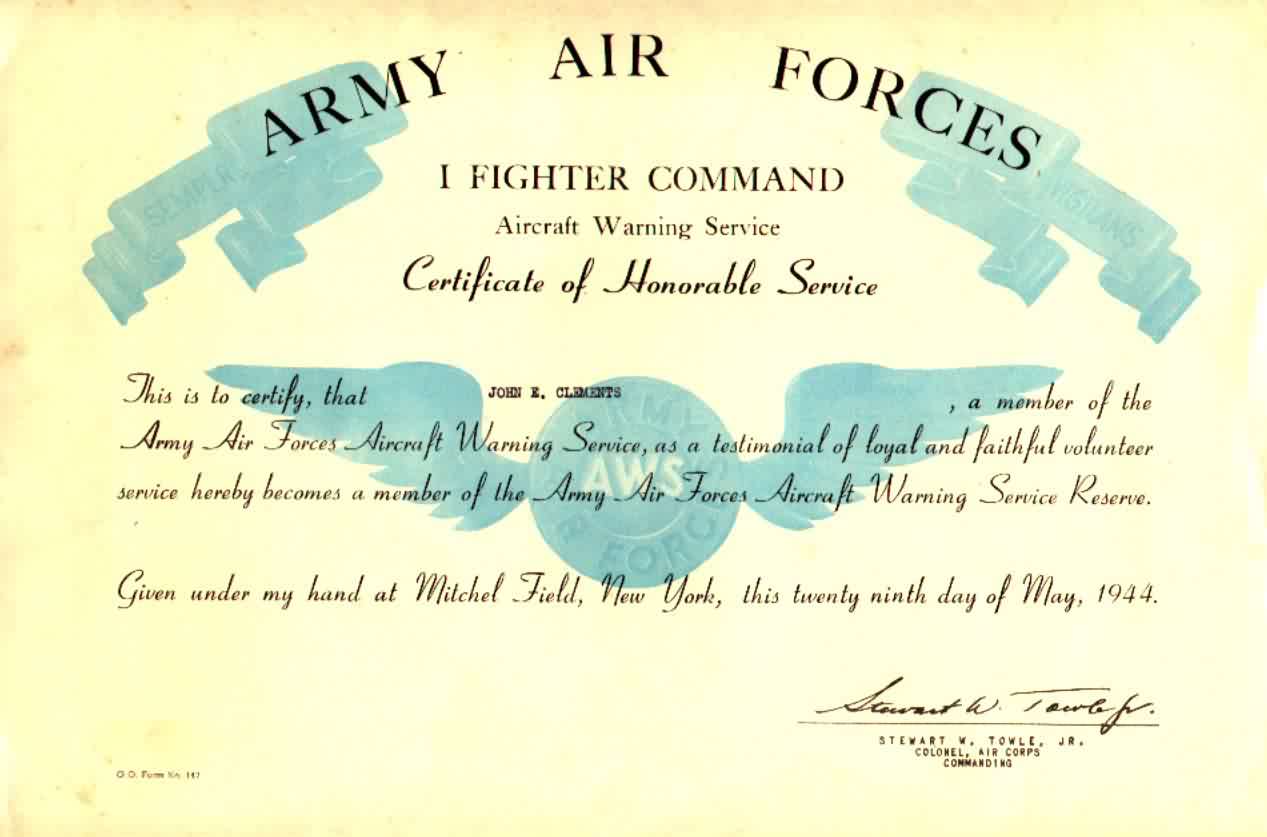contributed by John E. Clements
During World War II, the Ground Observer Corps, Aircraft Warning Service was established by the War Department. This document describes some early experiences with that service. Also included are War Department letters announcing the discontinuance of the service in 1944, and a certificate of service.
My memory has dimmed over the years so some of this may not be correct but no one is left that can help as most of the people that took an active part in our “post” as they were called, have passed away.
As I recall in early 1942 the U.S army rep came to see my father, Charles M. Clements, to ask him if he would be an observation post chief observer in the town of Swanville, Maine. Agreeing to do so, the next step was to set up a post. Far the present my fathers garage would fit the mold. But, being too noisy and busy another more suitable location was needed.
Tom Nickerson generously donated a building that he used for a logging camp to serve as the observation post. The next step was to get the cabin moved next to my father’s garage and filling station. Since patriotism ran high, volunteers were easy to come by and with the aid of a few skids and Russell Littlefields Mack Jr. truck, the 8 by 16 building was moved out of the woods and put on a proper resting place next to my fathers garage. The cabin was wired to put in a few lights and a plug in or two with the electricity coming from the garage.
There was also a stove and a few chairs in the building that were donated and a telephone with the party line # 254W4 that was put in by the telephone company. Over the next few weeks there was another addition to the building, a cot. This way pairs with night shift could take turns standing watch and sleeping. A table followed so that we could now play cribbage or any other card game to pass some time.
After the initial request of a post and volunteers were met, the army came and ran a school of instructing. It was a one night session held at the Grange Hall. After that day of schooling everything was all set to go!
Being a small town with not many people there was a limited number of volunteers. It turned out though, that with night shift you only had a shift every two weeks or so. Everyone did all they could to help out and even traded shifts if necessary. My father, being chief observer had the task of creating a schedule. Father, few of the elderly men and the neighborly women along with my brother Nicholas and I ( when we were not in school ) did most of the day shifts.
Nicholas and I each received a medal for serving 500 hours and my father received one for over 1,000 hours! I couldn’t tell you where that is right now it must have gotten lost over the past 55 years. We were each given a lapel pin for our service. The were arm bands available to be worn while on duty.
The army provided us with identification books and flash cards to help in identifying the difterent types of U.S, German, Japanese, and Italian planes. My brother an I got very proficient in our knowledge of the flash cards.
We called in the sighting to a Filter Center located in Bangor, Maine. This was before the dial telephone in our area was readily used, so the calls were all operator assisted. When she asked "number please” our response was, "Army Flash 254W4.” Which told her to connect us to the Filter Center at Bangor. It gave her the number of who to charge the call to.
As I recall our post code number was “X-Ray 461” and later became “Gimble 23”. When the Filter Center answered you would identify the post buy saying, “post code number X-Ray 461”. Then you would read from a sheet which was provided which covered the following items ( which may not be in order ):
The Filter Center would thank you and say that was all for now then every once in a while they would call you back to verify something. (Number of aircraft, or altitude, not who was winning the cribbage game.)


